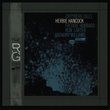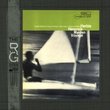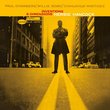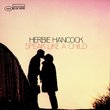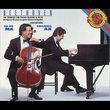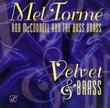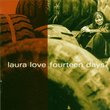| All Artists: Herbie Hancock Title: Takin' Off Members Wishing: 6 Total Copies: 0 Label: Toshiba EMI Japan Release Date: 12/15/2007 Album Type: Import Genres: Jazz, Pop Style: Bebop Number of Discs: 1 SwapaCD Credits: 1 |
Search - Herbie Hancock :: Takin' Off
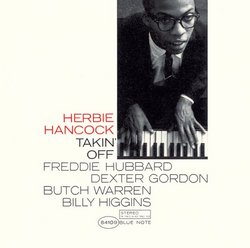 | Herbie Hancock Takin' Off Genres: Jazz, Pop
Japanese 24-bit remastered reissue of 1962 album for Blue Note, packaged in a miniature LP sleeve. EMI. 2003. |
Larger Image |
CD DetailsSynopsis
Album Description Japanese 24-bit remastered reissue of 1962 album for Blue Note, packaged in a miniature LP sleeve. EMI. 2003. Similar CDs
Similarly Requested CDs
|
CD ReviewsA very good debut finulanu | Here, there, and everywhere | 03/25/2008 (4 out of 5 stars) "While not quite a classic, Herbie's debut is still solid post-bop, even though there were better albums on the way. The bluesy, laid-back "Watermelon Man" has since become a jazz standard, and it's an unforgettable composition, though I think the Headhunters version is a little bit better myself. Most the rest of the album is in the same vein, but it's a good vein to be in, and besides, Herbie gets some solid compositions riding that groove - "Three Bags Full", "Empty Pockets", and "Driftin'" aren't groundbreaking, but they're plenty solid. "The Maze" is the record's other huge high point, an unforgettably eccentric melody, great post-bop groove, and a top-notch trumpet solo. The lone ballad, "Alone and I", is beautifully desolate. And Herbie knows exactly what he's doing here, never overstepping his bounds and taking things into experimental territory. It's good because it makes the record a ton more competent, but it also works against the record in a way, because my favorite Hancock album (Empyrean Isles) is incredibly experimental itself. Still, you can't blame a guy for playing it straight on his first record, and besides, Herbie does a good job of it. Later Hancock albums may overshadow it, but you shouldn't overlook Takin' Off just because of that." The introduction of excellence Mike Birman | Brooklyn, New York USA | 06/05/2008 (5 out of 5 stars) "Recorded in May 1962, midway through Herbie Hancock's two year Jazz apprenticeship that began the year before, all of the signs of his future greatness are here. Some of his electrifying talent and obvious promise are exemplified by his superb pianism: a solo rooted in the 1940s Blues and Stride technique of Albert Ammons and Meade Lux Lewis, single note lines with fragmented chords whose complex beauty evoke composer favorites like Ravel and Debussy, blues and gospel influenced melodies that are effortlessly stretched into 16 and 32-bar themes, and those crisp, caustic tone-clusters that Hancock would later use to such wonderful effect while anchoring the rhythm section in the second great Miles Davis Quintet. Like fingerprints on glass, his talent and great promise are all over the compositions that fill this set, writing that is mature beyond his years. The signs are all here on a recording made when Hancock was all of 22 years of age. His fine compositions include what would later be a huge hit for Mongo Santamaria: 'Watermelon Man', and 'Three Bags Full', which features a great tenor sax solo by Dexter Gordon that sounds as if he'd been listening closely to John Coltrane. Gordon's solo is not as blistering as Coltrane's sheets of sound but it is artful and deeply expressive, as he celebrates the strength of character needed to overcome private demons. Hancock's own personal favorite from this set is 'Alone and I', a ballad in A that features some exquisite Haiku piano playing that reveals the lyrical beauty in midnight loneliness; Dexter Gordon's haunting sax sings the wounded soul wandering in the darkness. It is an impressive and beautiful track. Freddie Hubbard's trumpet and flugelhorn are a powerful addition to the sound of this great album. His solos are never less than searching and strong. Three alternate cuts round out this superb debut. This remastered CD, its audio refurbished in a 24-bit resolution analog to digital transfer for the Rudy Van Gelder Edition, features instruments that sound full, warm and immediate, the hallmark of most Blue Note recordings of the early 1960s. This is an important release for all those who care about where Jazz was heading in those early revolutionary days. Strongly recommended. Mike Birman" Pure Gold Wendy Fortunato | Wynnewood, PA United States | 03/24/2006 (5 out of 5 stars) "This album is pure gold. Dexter Gordon and Freddie Hubbard take some of the most melodic and beautiful solos in the history of recorded jazz- not to mention Herbie's solos, where he introduces the left hand as a significant tool for improvisation (with the exception of a few, i.e. Art Tatum, Bud Powell, the left hand served more of a straight comping role, where as herbie develops his rhythmic technique to bring jazz piano to a whole new level). Listen to the solos on Driftin and Maze. Sheer genius. If you haven't heard this album, purchase it immediately. It is a must-hear for anyone even remotely interested in jazz."
|

 Track Listings (9) - Disc #1
Track Listings (9) - Disc #1